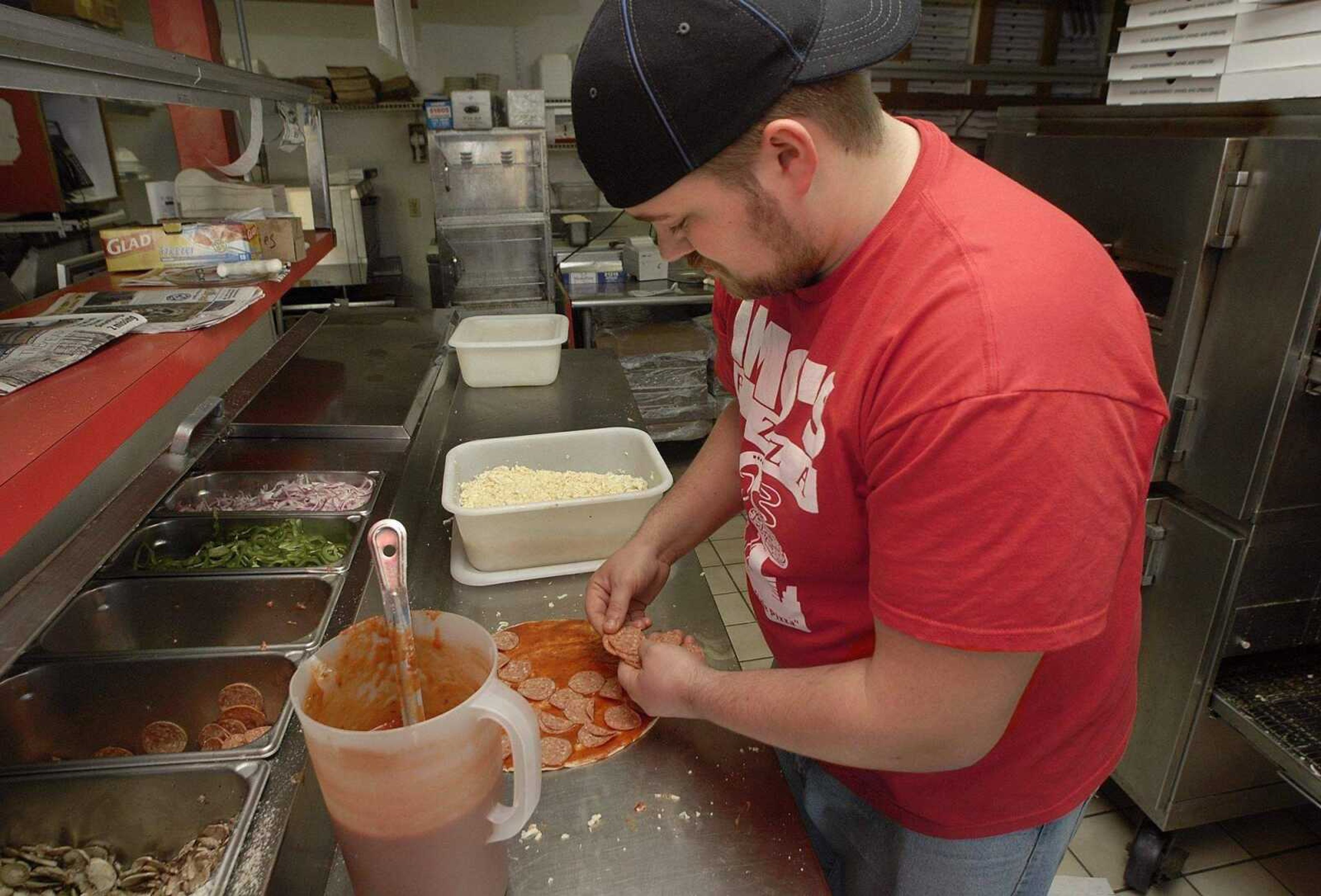Missouri minimum wage rises 40 cents
With the start of the new year, minimum wage workers are making 40 cents more per hour. "It's awesome," said Derick Charles, a full-time employee at Imo's Pizza in Cape Girardeau. "The increase is just better for the economy. Every little bit helps out."...
With the start of the new year, minimum wage workers are making 40 cents more per hour.
"It's awesome," said Derick Charles, a full-time employee at Imo's Pizza in Cape Girardeau. "The increase is just better for the economy. Every little bit helps out."
However, reaction has been mixed among area businesses, according to John Mehner, executive director of the Cape Girardeau Chamber of Commerce.
In November 2006, voters approved Proposition B, which mandated an increase in the state's minimum wage from $5.15 an hour to $6.15, with an automatic increase each year to keep pace with inflation. Last year, the minimum wage increased to $6.65 an hour. Thursday, it rose to $7.05 per hour. In July, the state's rate will rise to $7.25. For tipped employees, the minimum rate is $3.52 per hour.
Those Missouri businesses whose yearly gross income is less than $500,000 are exempt from the increase.
"I hear the loudest complaints from restaurant owners," Mehner said. "Their minimum wage is different because of tips, but the law still changed things for them and requires them to pay tipped employees 50 percent of the minimum regardless even if their tips put them in excess of minimum wage. This has been a real issue for them.
"Most other small businesses in the area still pay above minimum wage for help, except some part-time workers," he said. "I don't hear a ton of complaints yet."
Doc Cain, owner of Port Cape, said the legislature should freeze the minimum wage because he believes it's too costly to business owners.
He said that most of his servers' income comes from tips and gratuities, not the $3.52 per hour they now are paid.
If a server works 40 hours a week at the new rate and does not earn a single tip, he or she will earn $7,312.60 based on a 52-week pay period, as opposed to $6,905.60 when tipped workers were earning $3.32 per hour.
"The law makes us look for ways to reduce labor costs, which we have to do on the service side," Cain said. "My servers do a wonderful job, and I wouldn't trade them for anyone else on the service side."
Ron Bohnert, owner of Pagliai's Pizza and Pasta in Cape Girardeau, said the wage increase will not affect his business because his employees' wages already were higher than the latest increase.
"I raised it enough a long time ago in anticipation for recent increases," Bohnert said. "But the increase needs to stop somewhere. The minimum wage wasn't meant to keep up with the cost of living."
Likewise, Bill Zellmer, who owns four Buffalo Wild Wings in Southeast Missouri and one in Illinois, doesn't expect major changes in staffing or prices because of the increase.
The Consumer Price Index is what the Missouri Department of Labor and Industrial Relations uses as a base for its adjustments. Last fall, the department reported a 6 percent change in the Consumer Price Index between July 2007 and July 2008.
Robert Bonney, chief executive officer of the Missouri Restaurant Association, called the increase bad for business and prefers the government mandate that businesses pay the same federal $6.55 minimum wage.
"Businesses are suffering in this economy, and the restaurant industry is not immune to that," Bonney said. "And on top of that is the increase in the labor costs that affects restaurants. So we're against using the CPI as a way to measure whether we should increase the minimum wage."
He said in addition to possible cuts in labor, restaurant owners may also be faced with reducing or eliminating what they give back to their communities.
"Restaurant owners have supported communities in which they operate through sponsorships and discounts to further missions of other worthwhile organizations," Bonney said. "When you have something that causes restaurateurs to be less profitable, it affects the possibility to help their community."
State Sen. Jason Crowell, R-Cape Girardeau, supports having one minimum wage set on the federal level so that "all states are on a level playing field for wages."
Some states pay less than Missouri; Arizona, for example, pays $6.90 per hour. Washington, on the other hand, is the highest in the nation at $8.55 an hour.
Crowell believes the prospects of a repeal of Proposition B is unlikely.
"I do not believe that a minimum wage in Missouri which is higher than the national minimum wage is good for our state's economy because it puts us at a disadvantage relative to other states that have tied their minimum wage to the national minimum wage," Crowell said.
The U.S. Department of Labor estimates that of the 75.9 million Americans who were paid at hourly rates in 2007, nearly 1.7 million reported earning at or below the federal minimum wage rate. Those younger than 25 made up nearly half of those earning minimum wage. The Department of Labor also found that never-married workers were several times more likely than married workers to earn minimum wage.
bblackwell@semissourian.com
388-3628
Connect with the Southeast Missourian Newsroom:
For corrections to this story or other insights for the editor, click here. To submit a letter to the editor, click here. To learn about the Southeast Missourian’s AI Policy, click here.









